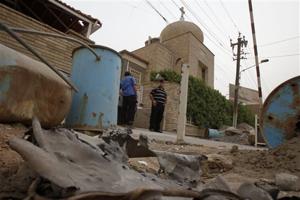
Seventeen years, one invasion, and much violence and heartache later, accessing food, water and basic services is still an enormous challenge for some of Iraq’s population.
Credits:Caritas
When Caritas Iraq was founded in 1992, the first Gulf War had recently ended and the country was under international sanctions.
Seventeen years, one invasion, much violence and heartache later, accessing food, water and basic services is still an enormous challenge for some of Iraq’s population.
“Before the sanctions, people had access to social and health services and even though infrastructure was archaic, it was working. Now it isn’t working,” says Archbishop Jean Sleiman, President of Caritas Iraq, on a visit to Caritas Internationalis’ Vatican City offices.
Young children in particular are at risk from malnutrition and ill health if they can’t access food and adequate medical care. Caritas Iraq tackles potential child health problems with its well baby programme.
The programme is currently helping 6000 mothers and around 10,000 children by providing them with food baskets, medical and psychological support. Child malnutrition stands at around 22 percent in Iraq and the food baskets help boost children’s health.
There are 10 centres across Iraq which offer the well baby programmes where women can get access to doctors and a nutritionist. The programme not only focuses on health and nutrition, mothers learn more about childcare too.
One of the great successes of the programme is the raised awareness among mothers regarding the positive impact on their child’s health by switching from bottle to breast feeding.
The programme also enables medical experts to monitor, raise awareness about and prevent childhood illnesses such as measles.
An orphanage in Al-Karrada disctrict, Baghadad is one of the places to have benefited from the well-baby programme. Caritas invited the children to one of their centres where they received health services, nutrition and training in social awareness though games and play.
One of the indirect benefits of the centre is the possibility for improving relations among the women and children. Caritas provides support for the mothers, who may come from different sects or backgrounds, to discuss peace issues with each other and it holds peacebuilding activities for the children too.
“If you begin peacebuilding with children, you’re building for the future,” says Archbishop Sleiman.
Sometimes Caritas goes into schools and helps children from the age of five onwards to express themselves by writing about and drawing what they’ve experienced. This helps them to identify and recognise their feelings early on and gives them a basis for understanding and accepting others.
Besides its work towards peace in schools, Caritas Iraq has trained “peace messengers” who go out into families in Baghdad and the north of Iraq and offer psychological support to help them resolve family conflict.
With three wars in 30 years and ongoing violence and trauma, there are whole generations of Iraqis who have never experienced a lasting peace.
Msgr Sleiman says that some of Iraq’s difficulties are rooted in history and contribute to making peace illusive. He also says that resolving the issues may take a long time.
“But,” he says, “we have to remember that what we have in common is more than what separates us.”
